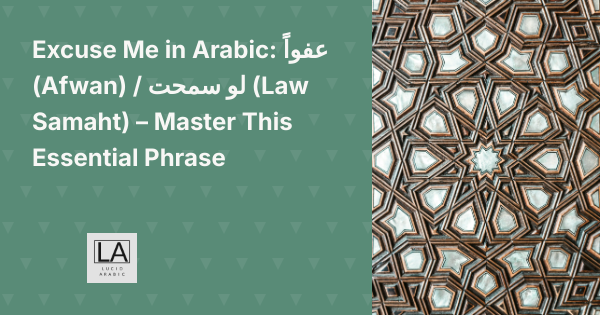When learning Arabic, one of the first things you’ll want to know is how to say “Excuse me.” This simple phrase comes in handy whether you’re trying to get someone’s attention, apologize, or politely interrupt. In Arabic, there are two main ways to say “Excuse me”: عفواً (Afwan) and لو سمحت (Law samaht). These phrases are essential in everyday communication, and understanding their proper use will help you navigate social situations smoothly.
Understanding “Excuse Me” in Arabic
In Arabic, عفواً (Afwan) and لو سمحت (Law samaht) are both commonly used to say “Excuse me,” but they serve slightly different purposes.
- عفواً (Afwan) is the equivalent of “Excuse me” or “You’re welcome” in English. It’s used primarily as a polite response when someone thanks you.
- لو سمحت (Law samaht) translates directly to “If you please” or “If you allow.” This phrase is used when requesting permission, asking for help, or getting someone’s attention.
Pronunciation Guide
- عفواً (Afwan) is pronounced as “Af-wan” with a soft “a” sound in both syllables. The “ع” (ayn) sound is a distinct, deeper sound in Arabic, which can take some practice to master.
- لو سمحت (Law samaht) is pronounced as “Law sa-maht” for men, and “Law samahti” for women. “Law” sounds like “low,” and “samaht” is pronounced as it’s written, with emphasis on the “ah” sound.
When to Use عفواً (Afwan) vs. لو سمحت (Law Samaht)
The key difference between these two phrases lies in the context of their use. Let’s break it down:
- Use عفواً (Afwan) when:
- Someone thanks you, and you want to respond with “You’re welcome.”
- You accidentally bump into someone and want to say, “Excuse me.”
- Use لو سمحت (Law samaht) when:
- You’re politely asking for something like directions, assistance, or clarification.
- You want to catch someone’s attention in a polite way.
Example Sentences for Everyday Conversations
Let’s look at some example sentences to see how these phrases work in everyday conversation.
- Asking for directions:
- لو سمحت, أين الحمام؟
Law samaht, ayna al-hammaam?
(Excuse me, where is the bathroom?)
- Responding to a thank you:
- شكراً على المساعدة!
Shukran ‘ala al-musa’ada!
(Thank you for the help!) - !عفواً
Afwan!
(You’re welcome!)
- Getting someone’s attention:
- لو سمحت, ممكن المساعدة؟
Law samaht, mumkin al-musa’ada?
(Excuse me, could you help me?)
- Apologizing for bumping into someone:
- !عفواً, لم أقصد ذلك
Afwan, lam aqsid thalik!
(Excuse me, I didn’t mean that!)
By practicing these sentences, you’ll build your confidence in using these phrases naturally in different settings.
Fun Fact: The Versatility of عفواً (Afwan)
Did you know that عفواً (Afwan) can be used in various situations, not just to say “Excuse me” or “You’re welcome”? In some dialects, it can also mean “pardon” or “forgive me.” It’s one of those multi-purpose words that enrich the language and makes Arabic more flexible. The simplicity of عفواً and its multiple uses reflect the rich politeness in Arab culture.
Practice Tip: Engage with Native Speakers
The best way to get comfortable using عفواً (Afwan) and لو سمحت (Law samaht) is through practice. Try incorporating these phrases into your daily interactions, even if you’re not in an Arabic-speaking country. You can:
- Ask for directions using لو سمحت (Law samaht) when role-playing with a language partner.
- Thank someone and respond with عفواً (Afwan) to practice polite exchanges.
- Watch Arabic-language videos and try to catch when speakers use these phrases, repeating them aloud to improve your pronunciation.
You can also practice with these simple prompts:
- Pretend you’re in a store and need to ask for the price of something:
لو سمحت, كم السعر؟
Law samaht, kam al-si’r?
(Excuse me, what’s the price?) - Imagine someone thanks you for holding a door open:
!عفواً
Afwan!
(You’re welcome!)
Final Thoughts
Learning to say “Excuse me” in Arabic, whether you use عفواً (Afwan) or لو سمحت (Law samaht), is a fundamental step in mastering the language. It not only helps you in polite conversation but also opens doors to deeper cultural connections. As you continue your language-learning journey, don’t forget that every word you practice builds confidence and fluency. So, next time you need to excuse yourself or ask for help, try using these essential phrases, and see how smoothly your conversations flow!
If you enjoyed this lessen and you want to study more Arabic lessons for free please check these:
Mastering the Arabic Phrase: “You’re Welcome”, “عفواً”
Say “Yes” in Arabic: An Easy and Fun Guide to Get Started!
Mastering the Power of Saying “No” “لا” (laa) in Arabic for Beginners

